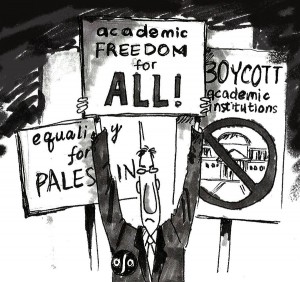ASA right to support Palestinian equality
The Dec. 16 vote by the American Studies Association to boycott Israeli academic institutions has been met with widespread criticism, with many university presidents — including USC’s own President C. L. Max Nikias — publicly denouncing the boycott. Most of this criticism, however, is based on a flawed understanding of what the boycott is all about.
As the ASA’s public statement reads, the academic boycott seeks to protest “the illegal occupation of Palestine, and the infringements of the right to education of Palestinian students and the academic freedom of Palestinian scholars and students in the West Bank, Gaza and Israel.”
Such a resolution is not an attack on academic freedom. Rather, it is precisely the repeated denial of scholarly freedom to Palestinians living under occupation that makes such a resolution all the more necessary.
The reality on the ground is that Palestinian students are denied the academic freedom as a direct result of living under occupation. These students are subject to frequent school closures, unprovoked arrests and are often denied freedom of exit, even when earning a scholarship to study abroad. This boycott means to bring attention to the frequent assaults on Palestinians’ academic freedom — not to infringe on the academic freedom of their Israeli colleagues.
On the contrary, the boycott’s guidelines encourage collaboration. Individual Israeli academics, students or cultural workers are still able to participate in the ASA conference and to give public lectures on campuses.
The connection between Israel’s academic institutions and its government agents perpetuating the occupation is hard to ignore. Both Haifa University and Hebrew University have special military intelligence and training programs for Israel’s secret service, the Shin Bet. Hebrew University’s Mount Scopus campus itself is partially built on occupied East Jerusalem.
Moreover, this boycott isn’t about singling out Israel as the world’s sole occupying force. There are, unfortunately, many violators of human rights on the world stage. What distinguishes Israel, however, is the role that the United States plays in underwriting its violations of international law. Despite the reality of millions of Palestinians living under occupation and despite the fact that Israel’s blockade on Gaza is a clear violation of the Fourth Geneva Convention’s prohibitive articles against the collective punishment of civilians, the United States sends Israel $3.1 billion per year in military aid.
Perhaps boycott isn’t the best solution. Perhaps it only galvanizes its opponents and perpetuates polarity. But, regardless if one disagrees with the effectiveness of the boycott, slamming the ASA as anti-Semitic or labeling its Jewish supporters as “self-hating Jews” are serious and troubling accusations. Such statements go to feed the faulty assumptions that: First, any criticism of Israel is synonymous to anti-Semitism and, second, that all Jewish people take the same position on this highly contested issue. Neither could be more inaccurate.
The international community continually condemns the occupation and the European Union imposes sanctions on Israeli settlements. If we allow condemnation of the occupation here, there is no reason academics can’t take part as well.
Yasmeen Serhan is a sophomore majoring in international relations. “Point/Counterpoint” runs Fridays.


Hi Yasmeen,
You are correct in saying that criticism of Israel, BDS campaigning is not necessarily anti-Semitism, yet no where do you say that it also can be. Your comments with regard to many items indicates you either have either never been to Israel or you choose to ignore realities that exist or simply have an emotional tie to what and how you view the Israeli/ Palestinian issues.
When you refer to Palestinian occupied lands in East Jerusalem, please tell me when there was a Palestinian State or Country, who were its elected Government or officials, what was its constitution, its geographic boundaries, and what was its currency. Simply there has never been a Palestinian country.
Assuming you have answers for the above, then I would also like you to answer which other countries in the world have territories that have been won by war(all of Europe to start with) that have returned the land to its original owners.
I assume when you are referring to University Students you are referring to those that study in universities in so called occupied West Bank or unoccupied Gaza. So, as Gaza is unoccupied and technically part of Egypt and the West Bank is Jordanian lands your Boycotts should be for Egyptian and Jordanian Universities.
If you are referring to Arab/Israeli’s or Palestinian/Israeli’s that go to Israeli universities and enjoy all the facilities the same as any other student irrespective of Ethnicity, race or religion, you have nothing to boycott over but rather should be praising Israel for how its universities conduct themselves.
There is a reason that Israel was not invited to Nelson Mandela’s funeral. One stands for oppression while the other stands for freedom and human rights.
We should all boycott Israel until it begins to treat the Palestinians with basic human respect.